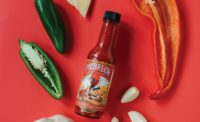2020 PREDICTIONS: CONSUMER INSIGHTS
Strong, Vibrant—and Vegan
Elite athletes lead the way to the rise and acceptance of vegan diets

Brooklyn Nets point guard Kyrie Irving credits a plant-based diet for improved body health and energy. Irving became an investor and brand ambassador for Beyond Meat.
PHOTO COURTESY OF: BEYOND MEAT INC. (WWW.BEYONDMEAT.COM)
My husband is a 30-year vegetarian who transitioned to a vegan diet as he prepared for a series of endurance trail races. Now in his 50’s, he’s never been in better shape.
Talking to him about the reason for the change, he cited several elite athletes in the NFL, NBA as well as leading endurance athletes who had made the change and were seeing strong performance results. The conversation started with Tom Brady but quickly evolved into a “did you also know” discussion of the growing number of elite vegan athletes.
It is an impressive list of championship-winning, Olympic-medaling, top-of-their field athletes across every conceivable athletic endeavor. Here is just a short list:

Check out our December 2019 issue for more food & beverage predictions!
• Tom Brady – New England Patriots quarterback who credits his vegan diet for playing at an MVP level in his 40’s. He is outspoken about the benefit of a plant-based diet.
• Kyrie Irving – Brooklyn Nets NBA guard, who in his veteran years, noticed he wasn’t able to recover as fast after games and workouts looked at his diet for a change. Now he says, “Been on more of a plant-based diet… So my energy is up; my body feels amazing.”
• Venus Williams – Tennis legend with seven Grand Slam single titles, five Wimbledon singles wins and four Olympic gold medals says, “I was diagnosed with an autoimmune disease, and I wanted to maintain my performance on the court. Once I started, I fell in love with the concept of fueling your body in the best way possible.”
• Lewis Hamilton – Formula 1 Race driver and four-time world champion who went vegan in 2017 and is primarily motivated by the impact on the animals. He regularly talks to his 6.8 million followers about his choice, the impact on the environment and our planet.
• Scott Jurek – Ultramarathoner with 16 titles and a personal record of running 165.7 miles over a 24-hour period — averaging 8:42 per mile. Jurek sees veganism as a long-term solution to avoiding a family history of chronic disease and has been a vegan since college.
• Barny du Plessis – Highly decorated bodybuilder who became a vegan just after retiring in 2013 due to a long list of growing health concerns and saw such a radical change in his fitness level that he returned to competition and won Mr. Universe the following year.
These athletes and many others state that they have more energy, increased strength and stamina, decreased fatigue and better performance and an overall better sense of well-being after the changing to veganism. That’s pretty convincing.
The thing is, these athletes have a tremendous platform to speak to millions in an authentic and convincing way that will change the trajectory of what has been a minority within a minority. Superstar athletes have the ability to influence the younger generations and we’re seeing an exponential change.
Not so long-ago veganism was considered cult-like, an outlier behavior that many thought would endanger the health of the person. Now we are seeing real-life models for what strong, vibrant and vegan can look like. In 2015, according to one survey, 3.4% of the population were vegetarian and just 0.4% were vegan. But today, 25% of 25-to-34-year-olds claim to be vegan or vegetarians.
The business side has been booming with the explosion of the Impossible Burger, Beyond Burger and other plant-based options that make it easier than ever to eat well and vegan. Vegan restaurants are growing in cities across the nations and even school menus and foodservice are changing to meet the demand.
This fall I saw the launch of the first 100% Vegan energy drink by Monster, called Java Monster Farmer’s Oats. Really! For 2020 and beyond, I expect to see this trend continue and for the conversation around vegan diet to become mainstream and normalized as consumers of all ages see their role models leading the way.
Looking for a reprint of this article?
From high-res PDFs to custom plaques, order your copy today!





